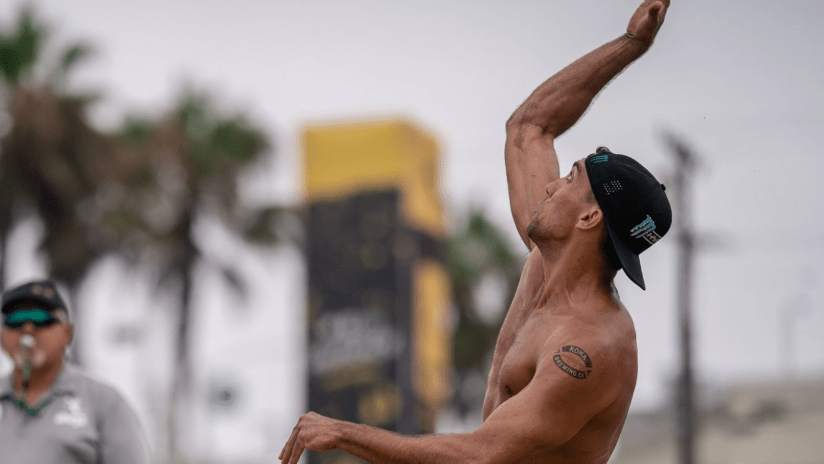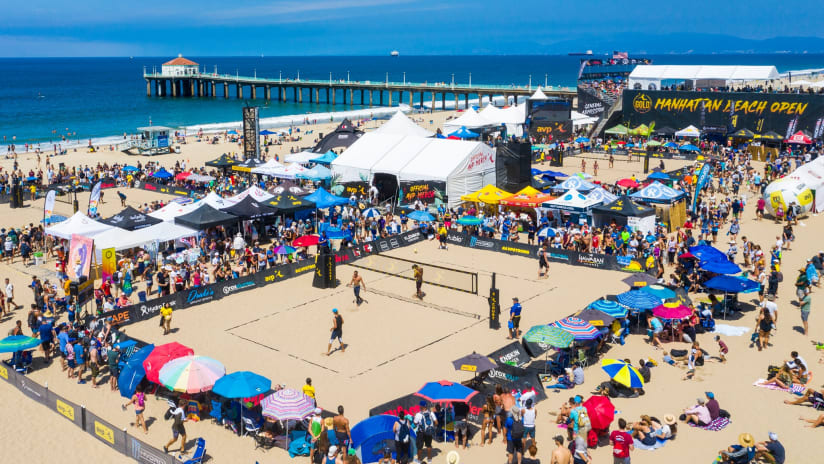It’s September of 2019. Chicago, Illinois. Trevor Crabb is sitting with Casey Patterson during some downtime at the AVP Chicago Open, annually the final stop of the season, and he’s telling him – he couldn’t be telling him this, could he?
Tri Bourne wins first Manhattan Beach Open after another Trevor Crabb guarantee
Published 06:00, 23 Aug 2021

Trevor Crabb in action (Photo: AVP)
“I almost wish it didn’t happen, because I know the feeling and what it did so I want that same feeling again,” Crabb says of his win two weeks earlier, at the Manhattan Beach Open. “It’s all downhill from here. Now it’s just rack ‘em up, tally ‘em up. Win as many as possible.”
He was at once right and wrong. For an American player, there is no sweeter feeling in the world of beach volleyball than winning the Manhattan Beach Open. It’s the biggie, the one that you must win if you are to be considered one of the elites, the greats, the legends. It’s the one that gets your name on the Manhattan Beach Pier, right alongside the players who only need a single name to be identified: Karch, Sinjin, Stoklos, Dodd, Steffes.
But no, it is not all downhill for Crabb. Not at all. For on Sunday afternoon in Manhattan Beach, he attained that feeling again, only better, bigger, somehow, this time than the last. This time, he wasn’t competing with a partner who was a rival-turned teammate out of necessity, as he was with Reid Priddy in 2019. This time, he was competing with his childhood friend, his longterm partner, the guy with whom he has won and lost and felt an Olympic berth slip out of his fingers. This time, he was winning and talking trash and having a riproaring blast with Tri Bourne.
“I told myself after we didn’t make the Olympics that the only way I could make myself feel better is by winning the Manhattan Beach Open,” Crabb said. “And I did, and I do feel better.”
He and Bourne won it in spectacular fashion, beating Casey Patterson and Chase Budinger, 21-19, 24-22 in the finals. He and Bourne did it after nearly having it taken from their grasp the round before, in the semifinals against Chaim Schalk and Theo Brunner, the team with whom they’ve butted heads on no rare occasion.
Down 16-12 in the second set after losing the first, it was Bourne who came alive, blocking, blocking, blocking some more. Eight straight points they scored, reversing a 16-11 deficit and turning it into a 19-16 lead they wouldn’t relinquish.
Six blocks, Bourne would finish with in the semifinals, which he and Crabb won, 15-11 in the third set.
“That’s big boy volleyball,” his trainer, Mykel Jekins, said from the VIP seating area.
Big boy volleyball, indeed. Bourne hit .490 on the match and finished with 33 kills, 12 more than Schalk, the second-highest leader in the category. He wasn’t nearly finished yet.
In the final, Bourne killed 21 of 30 attempts, finishing the match leading in hitting percentage (.500), digs (8), blocks (4), and soft blocks (9). If he was getting served, he was putting it away. If he wasn’t getting served, he was optioning, to the point that serving Crabb, a superb passer who put Bourne wherever the ball was needed, was a futile effort.
"I've never seen him that focused. He's in another zone." Gabby Bourne, wife of Tri Bourne
In truth, he was in a zone he has imagined for so long now. It is that very zone on which Bourne meditated on a daily basis for 18 months when he was out with an autoimmune disease. It is that very zone that Jenkins creates in his 100-plus degree garage, where he puts Bourne through grueling workouts that leave his clothes dripping with sweat.
It’s that zone that Crabb never thought he’d get back to.
All downhill from here?
He’s just getting started – racking ‘em up, tallying ‘em up, one guaranteed win at a time.
The women, meanwhile – well, there was no doubting that April Ross and Alix Klineman would be back atop the podium. Even when they took much of the past two weeks to celebrate their Olympic gold medal from Tokyo, even when they’re exhausted, drained, in much need of this two-week break from Manhattan to Chicago – even then, they are still the best team in the world, and at the moment, it’s not even a close race.
In a mirror image of Tokyo, only one team claimed a set off Ross and Klineman, and that was Geena Urango and Falyn Fonoimoana, in the first round of this tournament. After that? It was one sweep after the next, over teams many thought might be ready to usurp the gold medalists: Kristen Nuss and Taryn Kloth (21-9, 21-19), Sara Hughes and Brandie Wilkerson (21-16, 21-19), Kelly Claes and Sarah Sponcil (21-18, 21-17), and, in the finals, Emily Day and Betsi Flint (21-13, 22-20).
“The whole last few weeks have been surreal and this is just the cherry on top,” Klineman said. “I don’t think we knew what to expect because we’ve been exhausted mentally and emotionally but it was so nice to win in front of our friends and family.”










